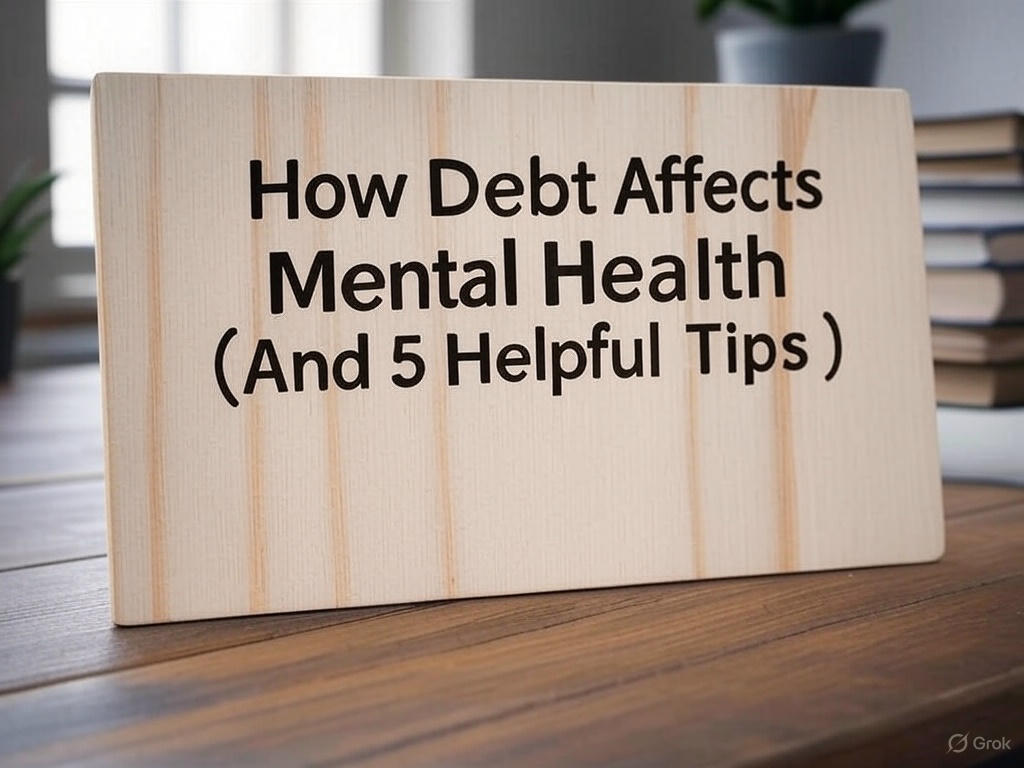How to Improve Your Mental Health When Facing Debt
Debt doesn’t just impact your wallet. In most cases, it also has a direct effect on your mental health, too. If you’re facing debt, you might be feeling overwhelmed, anxious, or even depressed. Recognizing how debt influences your mental well-being is crucial (as is finding effective strategies to manage these feelings and regain control).
The Connection Between Debt and Mental Health
Debt and mental health are closely connected. As your debt increases, so does the psychological burden. You may experience heightened levels of anxiety, fear of uncertainty, and feelings of shame or embarrassment. These emotions can interfere with your daily life, making it difficult to concentrate at work, maintain healthy relationships, or even get a restful night’s sleep.
On top of all this, debt-related stress can trigger or exacerbate mental health conditions like depression and anxiety disorders. The pressure to meet financial obligations might also lead to harmful coping mechanisms, such as substance abuse or social isolation, creating a challenging cycle of emotional distress and financial instability.
5 Helpful Tips
The good news is that debt doesn’t have to permanently dictate how you feel on an emotional level. Implementing the right strategies can help you reduce stress and reclaim emotional stability.
- Acknowledge and Face Your Debt
Avoiding or ignoring your financial issues can intensify stress and anxiety. It’s crucial to acknowledge your debt openly. Start by writing down all your outstanding debts, including amounts, interest rates, and due dates. While initially overwhelming, having clarity can actually ease anxiety by allowing you to create a tangible action plan.
When you confront your debt head-on, you replace fear with actionable steps, reducing feelings of helplessness and empowering yourself to regain control.
- Create a Realistic Budget
One of the most effective ways to alleviate debt-induced stress is by creating and maintaining a realistic budget. Begin by identifying your monthly income and expenses. Categorize your spending into essentials (housing, utilities, groceries), non-essentials (dining out, entertainment), and debt payments.
Trim unnecessary expenditures to prioritize debt repayment, but remember to allocate a modest amount for personal enjoyment to prevent feelings of deprivation. A sustainable budget helps reduce anxiety by giving you a clear financial roadmap and a sense of accomplishment as you track progress.
- Seek Professional Financial Advice
You don’t have to manage your financial struggles alone. Financial advisors or credit counselors can offer expert advice tailored to your specific situation. These professionals can help negotiate with creditors, consolidate debt, or restructure payments in a manageable way.
Also, don’t totally rule out the option of bankruptcy. In certain cases, a bankruptcy lawyer can help you figure out a smart way to erase your debt and still keep your most important assets (like your house). This can set you up for a debt-free future without nearly as much stress.
- Prioritize Your Mental and Emotional Health
Managing debt can consume your emotional energy. Prioritizing your mental health during this challenging time is vital. Practice self-care by ensuring you get enough sleep, eat balanced meals, and engage in regular physical activity, which can significantly reduce stress and improve emotional resilience.
Then there are mindfulness and relaxation techniques, such as meditation or yoga, which can help you stay grounded and maintain a clearer perspective. At the end of the day, allowing yourself to step back and relax periodically can enhance your problem-solving abilities and help you address your financial concerns in a much more thorough way.
- Reach Out and Talk to Someone
The burden of debt often feels heavier when carried alone. But the good news is that you don’t have to carry this on your own.
- Speak openly with trusted friends or family members to help relieve some of your emotional load.
- Professional counseling or support groups can be very valuable resources for emotional support.
Sharing your feelings about debt with others whom you trust can significantly lessen the sense of isolation and shame you might be experiencing. It can also help you gain valuable perspectives and practical advice from others who have been in similar situations. Definitely give this a try moving forward.
Moving Toward Financial and Emotional Health
Remember, you’re not defined by your debt. Financial struggles, while challenging, are manageable with the right mindset and tools. By acknowledging your situation and proactively dealing with it, you can alleviate the emotional toll debt has taken.
Improving your mental health during times of financial stress requires intentionality and patience, but with consistent effort, you can regain both financial stability and emotional peace of mind.
Take one step at a time, and remember that each small step brings you closer to freedom from debt – and the anxiety that comes with it.






